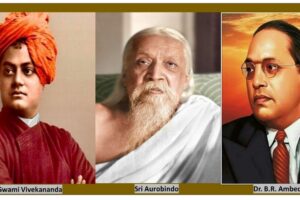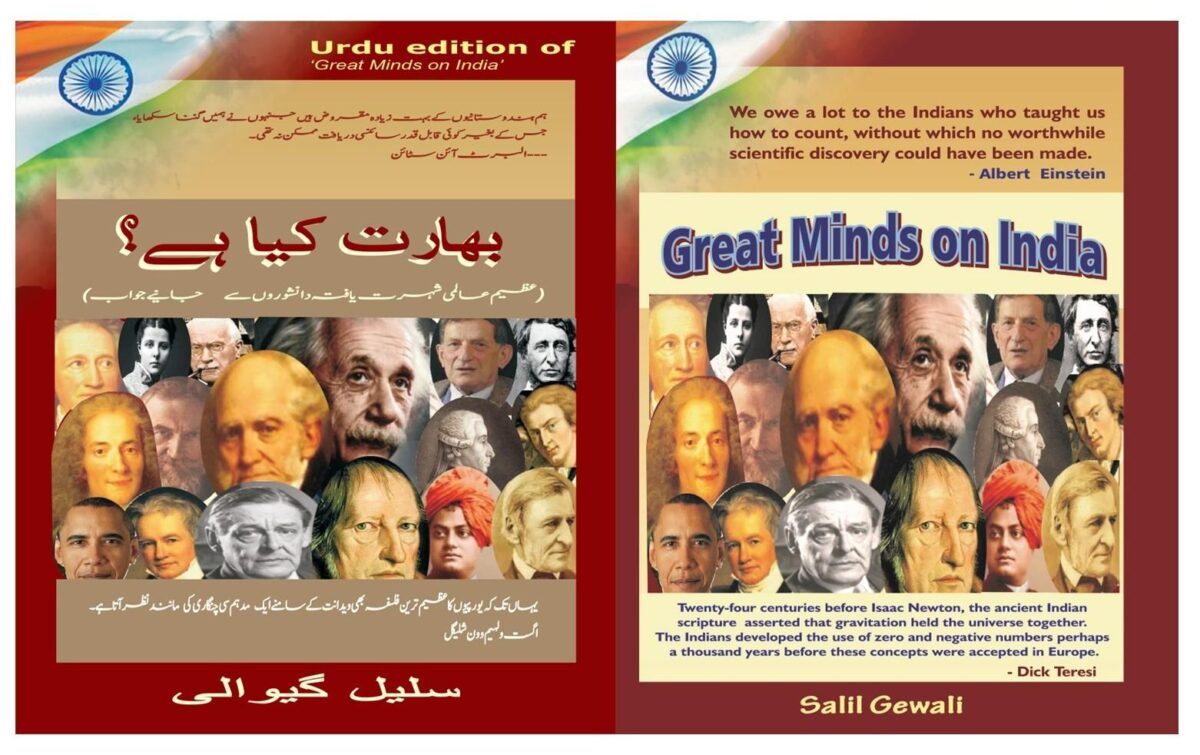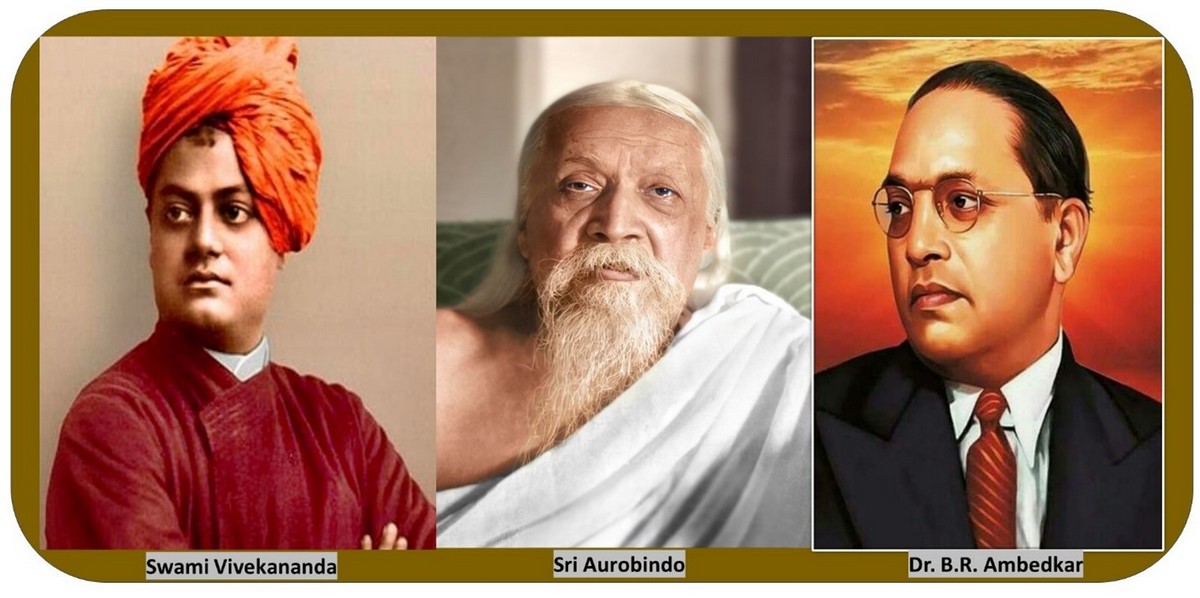This an article submission from Farzana Durrani.
Ms. Durrani writes in regard to one of this sites favorite Authors, Salil Gewali.
Farzana Durrani,
Brooklyn, New York, USA
I had often encountered tales of India’s remarkable historical contributions to fields such as mathematics, medicine, philosophy, and spiritualism. The stories told of a time when scholars from across the globe flocked to India in search of knowledge. Yet, I, like many others, regarded these narratives as little more than folklore, assuming that ancient Indian sciences had little relevance to our modern world.

Around a year ago, a conversation with a friend from Boston changed my perspective. He suggested that I read “Great Minds on India,” a book authored by Salil Gewali, a researcher from Shillong, India. “Great Minds on India” stands as a testament to Gewali’s two decades of research, a profound exploration into the thoughts and quotes of eminent scholars worldwide on ancient Indian sciences.
I promptly purchased a copy online and got down to read the book. The book’s cover was adorned with images of renowned scholars and scientists from diverse corners of the world. A striking quote by Albert Einstein graced the cover: “We owe a lot to the Indians, who taught us how to count, without which no worthwhile scientific discovery could have been made.” This proclamation by a Nobel laureate scientist left me pleasantly astonished, and as I delved further into the book, my doubts and reservations about India’s historical contributions faded into the past. It became abundantly clear that Indian sciences and arts had earned not just the accolades of poets and writers but also the admiration of scientists.
Undoubtedly, ancient India stood as a beacon of knowledge and science. Visionaries like Pythagoras and Al-Biruni, possessing expertise in physics, mathematics, astronomy, and natural sciences, embarked on quests to India in search of wisdom. Numerous Indian mathematicians and astronomers, including Aryabhata, Brahmagupta, Mahavira, and Bhaskara II, gained fame for their groundbreaking work. Regrettably, many modern-day Indians remain largely unaware of this invaluable scientific heritage. Those with some awareness often gravitate towards Western ideas and theories, inadvertently neglecting their own rich legacy.
Salil Gewali’s work serves as a potent reminder that not only do Western poets, scholars, and scientists draw from Indian sciences and arts, but they openly acknowledge this influence. The words of T.S. Eliot, a Nobel laureate in literature for the 20th century, resonate powerfully: “The great philosophers of India make most of the great European philosophers look like schoolboys.” A famous Nuclear scientist Julius Oppenheimer goes a step further, asserting, “What we shall find in modern physics is an exemplification, an encouragement, and a refinement of old Indian wisdom.”
This book transcends the realm of mere information; it is profoundly captivating. The arduous task of researching and collecting quotes from scholars worldwide on a singular subject, compiling them into book form, and subsequently providing comprehensive and engaging commentary is no small feat. Salil Gewali’s love for his homeland, dedication to his work, extensive research, and relentless efforts are vividly apparent within these pages. The book not only preserves the voices of Western scholars praising Indian sciences but also ensures accessibility to the general public.
It is beyond dispute that this reference book offers every Indian a reason to swell with pride. It not only illuminates nations worldwide about India’s scientific achievements and historical triumphs but also kindles a desire to explore Vedanta, Sanskrit philosophy, the Bhagavad Gita, and other fields of Indian wisdom. The book’s popularity and significance are underscored by its translation into thirteen languages, including English, Urdu, Arabic, German, Nepali, Bengali, and Gujarati.
For a time, I was spellbound by the enchantment of this book. Very recently I have obtained its Urdu edition from my friend coming to New York from New Delhi. Reading this subject matter in Urdu proved to be a delightful and enriching experience. The book has indeed inspired me to go deeper and deeper into ancient literature.
The Urdu translation was executed by Dr Syed Hussain of Hyderabad, with editing by Abdul Khaliq of Howrah in West Bengal. The Dr A.P.J. Abdul Kalam Foundation of Howrah, West Bengal, undertook the responsibility of publication. Salil Gewali received the esteemed Dr APJ Abdul Kalam Rashtra Gaurav Samman Award, presented by the Governor of Assam at Raj Bhavan in Guwahati. (WIKIPEDIA).
The former Governor of West Bengal, Keshari Nath Tripathi, expressed his admiration for Gewali’s work, as: “The remarkable book – ‘GREAT MINDS ON INDIA’ showcases the exceptionally rich civilization of India and its amazing contributions to the world in the development of modern science, mathematics, linguistics, metallurgy, cosmology, psychology, and other areas of study. The research-based work by Salil Gewali will serve as a light of wisdom even to the educated who have lost their faith in the ancient heritage.” Tripathi released the Bengali edition of the book in 2019.
As I concluded my exploration of this remarkable book, my hope and expectation for the future grew much more. I anticipate that additional translations of this treasure trove will emerge, for it is a repository adorned with the enchanting fragrance of diverse flowers—a delight that all would wish to savour. The book stands as a tribute to India, encapsulating its multifaceted legacy. Gewali undeniably merits high recognition for the creation of this exceptional literary masterpiece.
*********
Farzana Durrani, a scholar born in Karachi but now residing in New York, possesses a profound fascination for delving into the ancient wisdom of India. She has written this article in Urdu also.
Visits: 304





































A beautiful & inspiring recap of Salil Gewali’s book title by Mis Farzana Ji. I hope all people come to the recognition of Salil’s book “Great Minds On India” & appreciate the gifts of contributions within it. Like Salil’s book this article is worthy of sharing too. Namaste.
Thank u so much for ur lovely compliments, I’m humbled, Mr. Avatar. Ms. Farzana has spoken out her mind and it’s thought-provoking.
“Great Minds on India” is a proud book, an asset to the country. Mr Gewali deserves high apprecaition for his masterpiece. Thank you Farzana Durrani for this touching article.